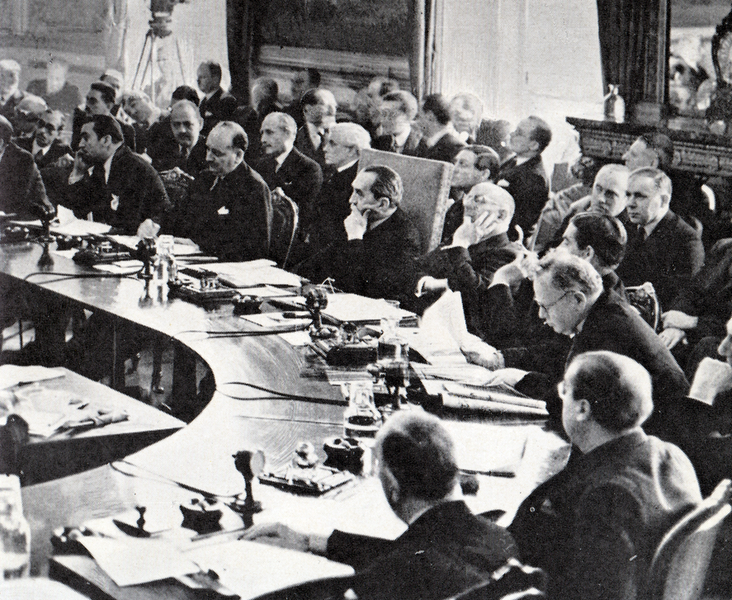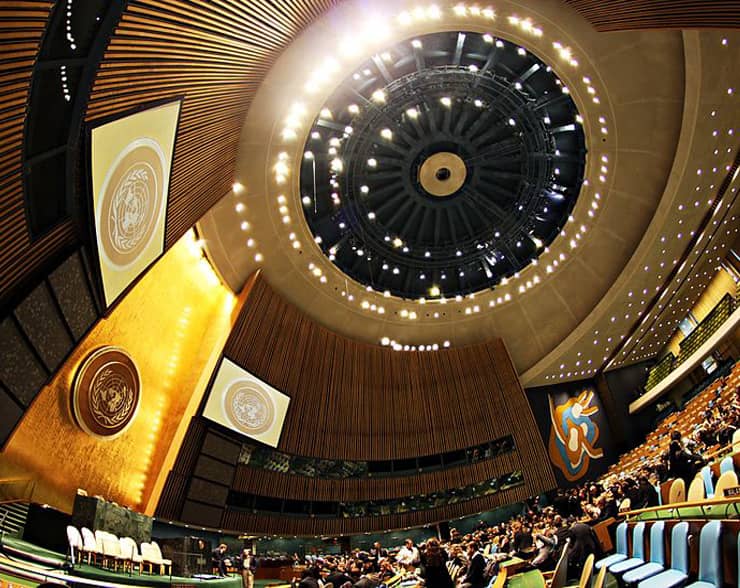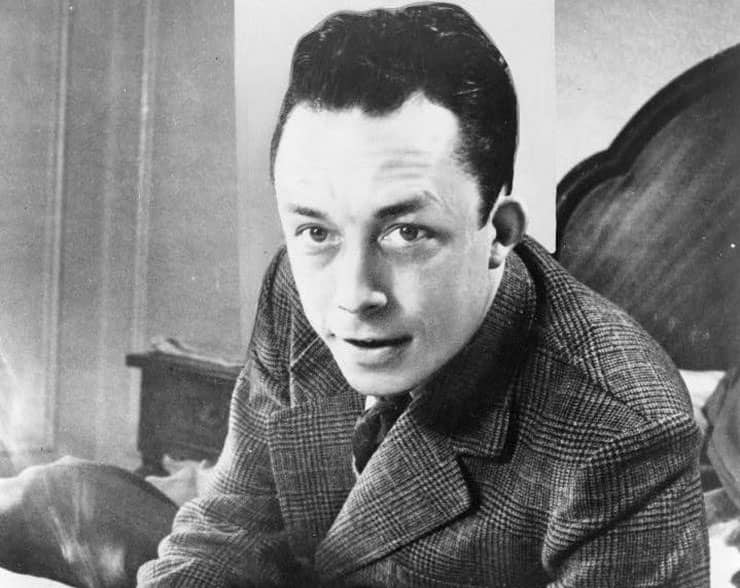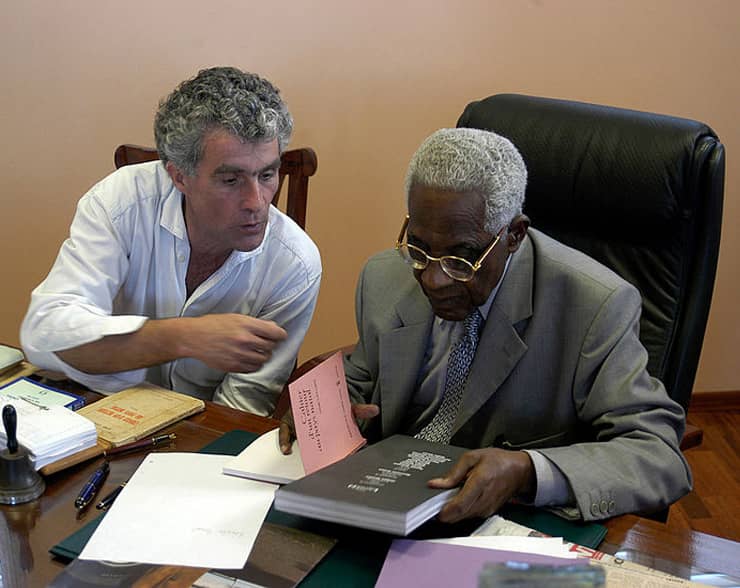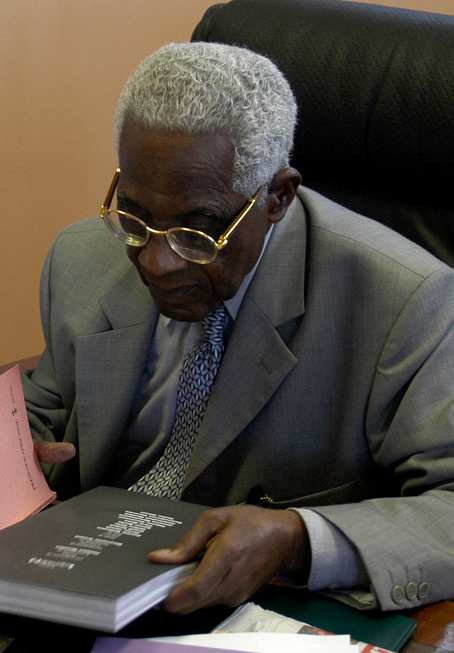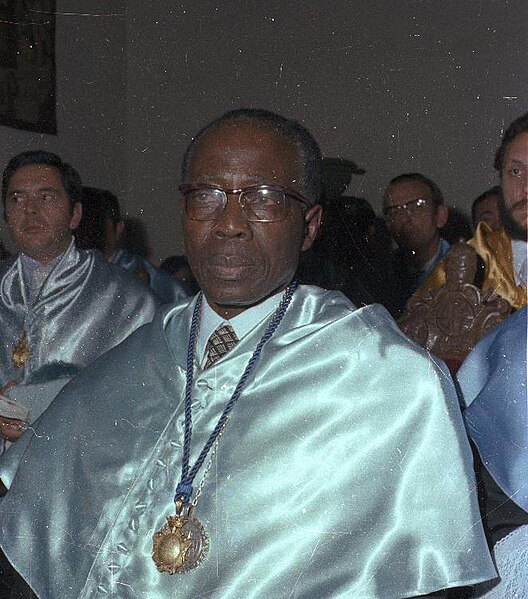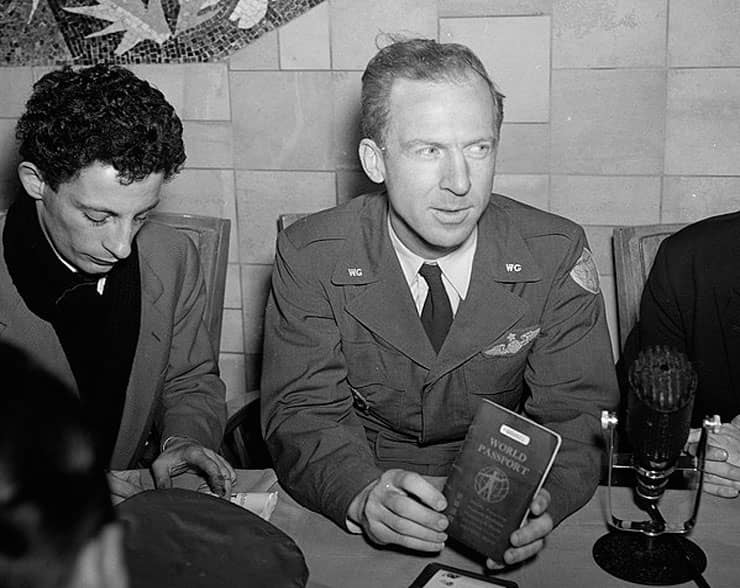 Portraits of World Citizens.
Portraits of World Citizens.
Garry Davis: «And Now the People Have The Floor».
Featured Image: Garry Davis by Wim van Rossem for Anefo, CC0, via Wikimedia Commons.
Garry Davis; who died 24 July 2013, in Burlington, Vermont; was often called “World Citizen N°1”. The title was not strictly exact as the organized world citizen movement began in England in 1937 by Hugh J. Shonfield and his Commonwealth of World Citizens; followed in 1938 by the creation jointly in the USA and England of the World Citizen Association. However; it was Garry Davis in Paris in 1948-1949 who reached a wide public and popularized the term “world citizen”.
The First Wave.
Garry Davis was the start of what I call “the second wave of world citizen action”. The first wave was in 1937-1940 as an effort to counter the narrow nationalism represented by Fascist Italy, Nazi Germany and militaristic Japan. This first world citizen wave of action did not prevent the Second World War; but it did highlight the need for a wider cosmopolitan vision. Henri Bonnet; of the League of Nations’ Committee for Intellectual Co-operation; and founder of the US branch of the World Citizen Association; became an intellectual leader of the Free French Movement of De Gaulle in London; during the War. Bonnet was a leader in the founding of UNESCO — the reason it is located in Paris — and UNESCO’s emphasis on understanding among cultures.
Stanley Bruce chairing the League of Nations Council in 1936. Joachim von Ribbentrop is addressing the council. By Commonwealth of Australia, Public domain, via Wikimedia Commons
The League of Nations and its unused Peace Army.
The Second Wave.
The Second Wave of world citizen action in which Garry Davis was a key figure lasted from 1948 to 1950 — until the start of the war in Korea and the visible start of the Cold War; although, in reality, the Cold War began in 1945 when it became obvious that Germany and Japan would be defeated. The victorious Great Powers began moving to solidify their positions. The Cold War lasted from 1945 until 1991 with the end of the Soviet Union. During the 1950-1991 period; most world citizen activity was devoted to preventing a war between the USA and the USSR, working largely within other arms control/disarmament associations and not under a “world citizen flag.”
The Third Wave.
The Third Wave of world citizen action began in 1991 with the end of the Cold War and the rise again of narrow nationalist movements; as seen in the break up of the Soviet Union and Yugoslavia. The Association of World Citizens with its emphasis on conflict resolution, human rights, ecologically-sound development, and understanding among cultures is the moving force of this Third Wave.
The two-year Second Wave was an effort to prevent the Cold War which might have become a hot World War Three. In 1948; the Communist Party took over Czechoslovakia; in what the West called a “coup”; more accurately a cynical manipulation of politics. The coup was the first example of a post-1945 change in the East-West balance of power; and started speculation on other possible changes as in French Indochina or in 1950 in Korea. 1948 was also the year that the UN General Assembly was meeting in Paris.
The United Nations did not yet have a permanent headquarters in New York; so the General Assembly first met in London and later in Paris. All eyes; especially those of the media, were fixed on the UN. No one was sure what the UN would become; if it would be able to settle the growing political challenges or “go the way of the League of Nations”.
Basil D Soufi, CC BY-SA 3.0 <https://creativecommons.org/licenses/by-sa/3.0>, via Wikimedia Commons.
U.N. General Assembly: Can It Provide the Needed Global Leadership?.
«Song and Dance” Actor.
Garry Davis, born in 1921; was a young Broadway actor in New York prior to the entry of the US in the World War in 1941. Garry Davis was a son of Meyer Davis; a well-known popular band leader who often performed at society balls and was well known in the New York-based entertainment world. Thus it was fairly natural that his son would enter the entertainment world, as a “song and dance” actor in the musical comedies of those days. Garry had studied at the Carnegie Institute of Technology; a leading technology institution.
When the US entered the war; Garry joined the Army Air Force and became a bomber pilot of the B-17, stationed in England with a mission to bomb targets in Germany. Garry’s brother had been killed in the Allied invasion of Italy; and there was an aspect of revenge in bombing German military targets until he was ordered to bomb German cities in which there were civilians.
The Creation of a World Federation with powers to prevent War.
At the end of the War and back as an actor in New York; he felt a personal responsibility toward helping to create a peaceful world and became active with world federalists; who were proposing the creation of a world federation with powers to prevent war; largely based on the US experience of moving from a highly decentralized government under the Articles of Confederation, to the more centralized Federal Government structured by the Constitution.
At the time, Garry had read a popular book among federalists; The Anatomy of Peace by the Hungarian-born Emery Reves. Reves had written:
“We must clarify principles and arrive at axiomatic definitions as to what causes war and what creates peace in human society.” If war was caused by a state-centric nationalism as Reves, who had observed closely the League of Nations, claimed, then peace requires a move away from nationalism. As Garry wrote in his autobiography My Country is the World (1) “In order to become a citizen of the entire world, to declare my prime allegiance to mankind, I would first have to renounce my United States nationality. I would secede from the old and declare the new”.
United World Citizen International Identity Card.
In May 1948, knowing that the UN General Assembly was to meet in Paris in September; and earlier the founding meeting of the international world federalists was to be held in Luxembourg, he went to Paris. There he renounced his US citizenship and gave in his passport. However; he had no other identity credentials in a Europe where the police can stop you and demand that you provide identity papers. So he had printed a “United World Citizen International Identity Card” though the French authorities listed him as “Apatride d’origine americaine”. Paris after the War was filled with “apatride”; but there was probably no other “d’origine americaine”
Giving up US citizenship and a passport which many of the refugees in Paris would have wanted at any price was widely reported in the press and brought him many visitors. Among the visitors was Robert Sarrazac who had been active in the French resistance and shared the same view of the destructive nature of narrow nationalism; and the need to develop a world citizen ideology. Garry was also joined by the young Guy Marchand; who would later play an important role in structuring the world citizen movement.
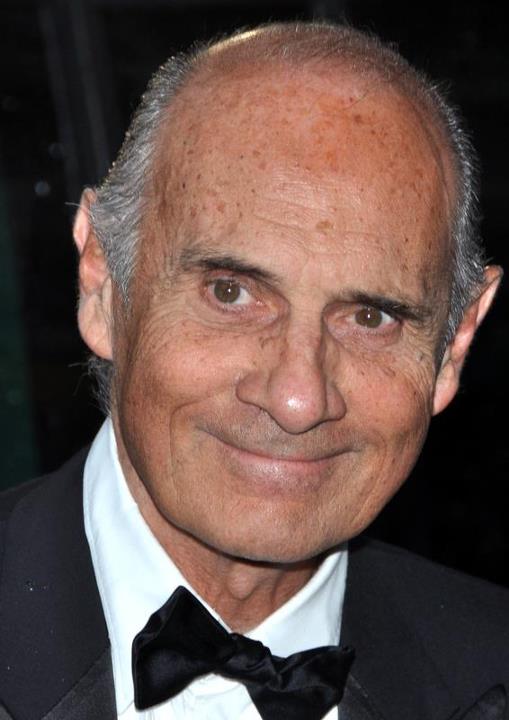
Guy Marchand By Georges Biard, CC BY-SA 3.0 <https://creativecommons.org/licenses/by-sa/3.0>, via Wikimedia Commons.
World Citizenship.
As the French police was not happy with people with no valid identity papers wondering around; Garry Davis moved to the large modern Palais de Chaillot with its terraces which had become “world territory” for the duration of the UN General Assembly. He set up a tent and waited to see what the UN would do to promote world citizenship. In the meantime; Robert Sarrazac who had many contacts from his resistance activities set up a “Conseil de Solidarite” formed of people admired for their independence of thought, not linked to a particular political party.
The Conseil was led by Albert Camus, novelist and writer for newspapers, Andre Breton, the Surrealist poet, l’Abbé Pierre and Emmanuel Mounier, editor of Esprit, both Catholics of highly independent spirits as well as Henri Roser, a Protestant minister and secretary for French-speaking countries of the International Fellowship of Reconciliation.
Albert Camus, Nobel prize winner. By Photograph by United Press International, Public domain, via Wikimedia Commons.
Albert Camus: Stoic Humanist and World Citizen.
An Interruption.
Davis and his advisors felt that world citizenship should not be left outside the General Assembly hall but had to be presented inside as a challenge to the ordinary way of doing things, “an interruption”. Thus, it was planned that Garry Davis from the visitors balcony would interrupt the UN proceedings to read a short text; Robert Sarrazac had the same speech in French, and Albert Crespey, son of a chief from Togo had his talk written out in his Togolese language.
In the break after a long Yugoslav intervention, Davis stood up. Father Montecland, “priest by day and world citizen by night” said in a booming voice “And now the people have the floor!” Davis said “Mr Chairman and delegates: I interrupt in the name of the people of the world not represented here. Though my words may be unheeded, our common need for world law and order can no longer be disregarded.” After this, the security guards moved in, but Robert Sarrazac on the other side of the Visitors Gallery continued in French, followed by a plea for human rights in Togolese. Later, near the end of the UN Assembly in Paris, the General Assembly adopted without an opposition vote, the Universal Declaration of Human Rights which became the foundation of world citizens’ efforts to advance world law.
Eleanor Roosevelt holding poster of the Universal Declaration of Human Rights (in English), Lake Success, New York. November 1949. By FDR Presidential Library & Museum, CC BY 2.0 https://creativecommons.org/licenses/by/2.0, via Wikimedia Commons.
Human Rights: The Foundation of World Law.
The Rue du Cherche Midi.
Dr Herbert Evatt of Australia was the President of the UN General Assembly in 1948. He was an internationalist who had worked during the San Francisco Conference creating the UN to limit the powers of the Permanent Five of the Security Council. Evatt met with Davis a few days after the “interruption” and encouraged Davis to continue to work for world citizenship, even if disrupting UN meetings was not the best way.
Shortly after highlighting world citizenship at the UN; Garry Davis went to the support of Jean Moreau; a young French world citizen and active Catholic; who as a conscientious objector to military service, had been imprisoned in Paris as there was no law on alternative service in France at the time. Davis camped in front of the door of the military prison at the Rue du Cherche Midi in central Paris. As Davis wrote:
“When it is clearly seen that citizens of other nations are willing to suffer for a man born in France claiming the moral right to work for and love his fellow man rather than be trained in killing him, as Jesus, Buddha, Lao Tsu, Tolstoy, St Francis of Assisi, Gandhi, and other great thinkers and religious leaders have taught, the world may begin to understand that the conscience of Man itself rises above all artificially-created divisions and fears.” (2).
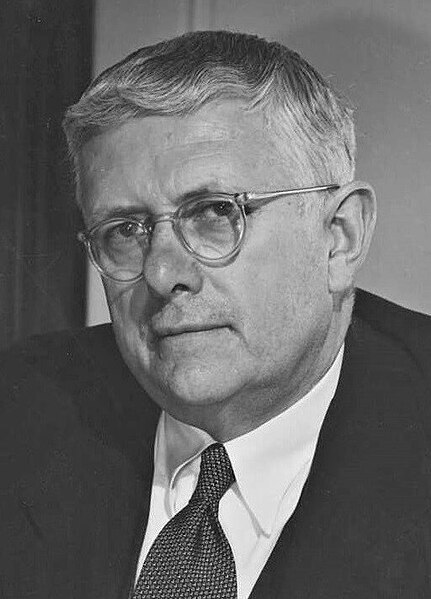
Dr Herbert Evatt By Max Dupain, Public domain, via Wikimedia Commons.
Others joined Davis in camping on the street. Garry Davis worked closely on this case with Henri Roser and Andre Trocme of the Fellowship of Reconciliation. Davis was put in jail for camping on the city street and also for not having valid identification documents, but his place on the street was filled with others, including a German pacifist, an act of courage so soon after the end of the War. It took another decade before alternative service in France was put into place, but Davis’ action had led to the issue being widely raised in France, and the link between world citizenship and non-violent action clearly drawn.
Garry Davis was never an “organizational man”. He saw himself as a symbol in action. After a year in France with short periods in Germany, he decided in July 1949 to return to the US. As he wrote at the time:
“I have often said that it is not my intention to head a movement or to become president of an organization. In all honesty and sincerity, I must define the limit of my abilities as being a witness to the principle of world unity, defending to the limit of my ability the Oneness of man and his immense possibilities on our planet Earth, and fighting the fears and hatreds created artificially to perpetuate narrow and obsolete divisions which lead and have always led to armed conflict.”
Perhaps by the working of karma, on the ship taking him to the USA, he met Dr. P. Natarajan, a south Indian religious teacher in the Upanishadic tradition. Natarajan had lived in Geneva and Paris and had a doctorate in philosophy from the University of Paris. He and Davis became close friends, and Davis spent some time in India at the center created by Natarajan who stressed the development of the inner life. “Meditation consists of bringing all values inside yourself” was a motto of Natarajan.
It was at the home of Harry Jakobsen, a follower of Natarajan, on Schooly Mountain, New Jersey that I first met Garry Davis in the early 1950s. I was also interested in Indian philosophy, and someone put me in contact with Jakobsen. However, I had joined what was then the Student World Federalists in 1951 so I knew of the Paris adventures of Garry. We have since seen each other in Geneva, France and the US from time to time.
As well as a World Citizen.
Some world federalists and world citizens thought that his renunciation of US citizenship in 1948 confused people. The more organization-minded world federalists preferred to stress that one can be a good citizen of a local community, a national state as well as a world citizen. However Davis’ and my common interest in Asian thought was always a bond beyond any tactical disagreements.
Today, it is appropriate to cite the oft-used Indian image of the wave as an aspect of the one eternal ocean of energy. Each individual is both an individual wave and at the same time part of the impersonal source from which all comes and returns. Garry Davis as a wave has now returned to the broader ocean. He leaves us a continuing challenge writing:
“There is vital need now for wise and practical leadership, and the symbols, useful up to a point, must now give way to the men qualified for such leadership.”
Notes.
1) Garry Davis. My Country is the World (London: Macdonald Publishers, 1962)
2) Garry Davis.Over to Pacifism:A Peace News Pamphlet (London: Peace News, 1949)
Rene Wadlow, President, Association of World Citizen.

Presidente, Asociación de World Citizens (AWC).
Cursó Estudios de Relaciones Internacionales en La Universidad de Chicago.
Cursó Estudios en el Programa Especial de Civilización Europea en
La Universidad de Princeton
Here are other publications that may be of interest to you.
Sorry, no posts were found.
